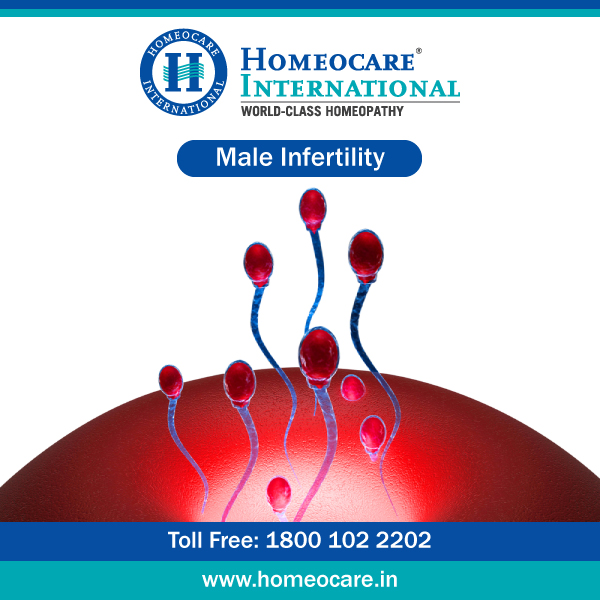What is male infertility?
Male infertility refers to the incapability of a male in a fertile female to cause pregnancy. According to a recent report by WHO on the status of infertility in India, of all infertility cases, approximately 50% is due to “male factor” infertility, owing to the reproductive anomalies in the male. Male infertility is usually caused by semen deficiencies. There are many causes of male and female infertility. In more than a third of instances of infertility, Male infertility is caused by low sperm output, abnormal sperm function, or blockages preventing sperm delivery. Diseases, accidents, chronic health issues, lifestyle decisions, and other reasons may contribute to male infertility. It may be stressful and frustrating not to be able to conceive a kid, but a number of male infertility medicines are accessible. Male infertility is most commonly caused by sperm output issues or sperm delivery issues.
Common Causes of Male Infertility
It relies on many things to make mature, healthy sperm that really can travel. Problems may prevent the sperm from reaching the egg. Moreover, the temperature of the scrotum may affect fertility. Males have four major causes of infertility, namely Pituitary disorder, A Gonad disorder, Sperm disease, and Unknown causes.
1) Sperm Disorders
Different sperm disorders that include azoospermia, oligospermia, poor motility of sperm, abnormal or strange sperm shape, not fully grown sperm are really accountable for male infertility. Choices in way of living can reduce sperm counts. Smoking, alcohol consumption, and taking certain medicines may reduce sperm counts. Long-term disease (such as kidney failure), diseases of the childhood (such as mumps), and chromosome or hormone issues (such as low testosterone) are other causes of low sperm counts. Damage can cause small or no sperm to the reproductive cycle. A birth defect or an infection-like issue may trigger a blockage.
2) Varicoceles.
Whereas in male infertility, varicoceles play a vital role. Varicoceles are in the scrotum swollen veins. By blocking adequate blood drainage, they damage sperm development. Varicoceles may cause blood from your stomach to flow back into your scrotum. Then the testicles are too hot for sperm production. This can lead to low sperm counts.
3)Retrograde Ejaculation.
In addition, when semen comes backwards in the body, retrograde ejaculation occurs. Instead of out the penis, they go into your bladder. This occurs when during orgasm nerves and muscles in your bladder do not close. Semen may have normal sperm, but the vagina cannot be reached by the semen.
Additionally, Immunologic Infertility, Obstruction, Hormonal disorders, Chromosomes imbalance, and Certain medications can change sperm production, function, and delivery. Male infertility generally happens due to abnormal sperm, insufficient sperm counts, or ejaculation issues. Sperm can be considered abnormally for two possible reasons, the namely unusually short life span of the sperm and/or low mobility. Sperm abnormalities may be caused by one or more of the reasons, namely Inflammation of the testicles, swollen veins in the scrotum, abnormally developed testicles. Reasons for low sperm count or absence of sperm include one or more reasons, namely pre-existing genetic condition, excessive use of alcohol and tobacco or other drugs, hernia repairs, severe mumps post-puberty infection, hormone disorder, exposure to toxic chemicals and radiation, pre-infection blockage, wearing narrow or tight clothing.
What is the treatment for male infertility?
Male infertility treatments may be based on the underlying root of the problem, or evidence-based treatments that increase fertility may be suggested in the event of no recognized issue. Treatments include surgery to correct or repair anatomical abnormalities or harm to reproductive organs. Medication can address certain problems affecting male fertility, including imbalances in hormones and erectile dysfunction. If other treatments do not restore fertility, assistive reproductive technologies, such as in vitro fertilization, may be efficient. A physical exam enables issues such as infection, hernia, or varicocele to be identified. A health care provider may also ask a person to provide a sample of semen to evaluate his sperm’s health and quality. Some other important tests may include blood hormone measurement, testicular biopsy, or genetic screening in male infertility is critical.
Homeopathy treatment for Male Infertility
Proven and tested in thousands of infertility patients with a success rate of 85 per cent. Homeopathic treatment is not only effective in increasing sperm count but also helps in increasing sperm motility and sperm Volume, abnormal sperm morphology can also be corrected with homeopathy treatment.
Male Infertility treatment in homeopathy is safe and free from side effects and is prescribed based on the theory of individualization. Homeopathy does not treat infertility as a disease but as a corrective imbalance. It can reverse Infertility as it passes to Infertility’s root cause and stimulates the ability of the body to cure itself. Expert homeopaths at Homeocare International systematically assess and treat all medical and psychological causes of male infertility using sophisticated constitutional homeopathy treatment based on the genetic constitution of people. When both active partners are included in constitutional therapy, the achievement rate is high.
To know more information about homeopathy treatment for male infertility at Homeocare International. Please call our toll-free number 1800-102-2202 or visit https://www.homeocare.in/infertility.html
Author Bio: Dr Ravi Kumar M, BHMS is a proficient homeopath with over 14 years of rich clinical experience and is offering services in Homeocare International Kukatpally branch, Hyderabad, Telangana.








